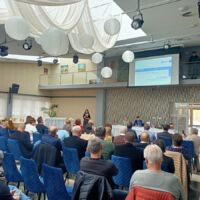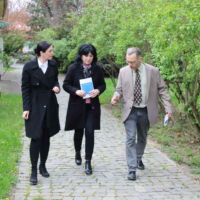Tackling cross-border challenges – seminar on legal and administrative obstacles at the Committee of the Regions
Policy-making | 19 April 2023
Policy-making | 19 April 2023
On 17 April 2023, together with the members of the European Cross-Border Citizens’ Alliance, the Committee of the Regions (CoR) organised a seminar dedicated to the legal and administrative obstacles hindering cross-border mobility and integration. The event formed part of the revision process of the proposal on a European Cross-Border Mechanism (ECBM) refused by the Council in 2021.
After the greetings delivered online by Magali Altounian, vice-mayor of the city of Nice and rapporteur of the new ECBM proposal at the CoR, in the first panel, selected cases of the B-Solutions initiative were presented. (B-Solutions is a program triggered by the Commission and managed by the AEBR aimed at unfolding and eliminating cross-border legal obstacles.) The examples were collected from different geographic sites of the EU and they addressed diverse subjects. Leyre Azcona (representing the EGTC Euroregion Nouvelle-Aquitaine – Euskadi – Navarra) pointed at the difficulties of mutual acknowledgement of the diplomas in the health and social sectors at the Spanish-French borderland; Loïc Delhuvenne, director of the EGTC Lille-Kortrijk-Tournai presented the obstacles hindering the employment of unemployed persons across the Belgian-French border; Annika Daisley, project manager of the Norwegian-Swedish Svinesund Committee spoke about the problems stemming from the differences between the rules and standards of wood industry; Rafał Peszka, an entrepreneur from the Lithuanian-Polish border told his story about the establishment of a cross-border business incubator which is impossible to do by public bodies; Judit Füzér, deputy director of the Hungarian-Croatian-Slovenian Pannon EGTC listed the obstacles hindering the cross-border retail of local products; Joris Bengevoord, the mayor of the Dutch city of Winterswijk focused on cross-border integration of renewable energy systems.
As the panel’s moderator, Martín Guillermo-Ramírez, secretary general of the Association of European Border Regions (AEBR) highlighted it: the diversity of the cases clearly justified the real need of an instrument facilitating the management of the obstacles.
The second round-table moderated by Gyula Ocskay, secretary general of CESCI concentrated on the ECBM as a potential tool reclaimed by the participants of the first panel. Jean Peyrony, director general of the French Mission Opérationnelle Transfrontalière (the MOT) gave a brief summary of the history of the proposal on the ECBM and the activities of the multi-level working group operated by the Grand Duchy of Luxembourg between 2015 and 2018. Balázs Loppert, representing the Hungarian Ministry of Foreign Affairs and Trade explained why the Hungarian government has always been supporting the initiative. Mr Nikola Dobroslavić, the president of the Dubrovnik-Neretva Region drew the attention to the CoR’s opinion dating back to 2015 which had raised the issue of a new instrument for the first time. The opinion was drafted by Mr Dobroslavić himself. Mr Sandro Gozi summarised the report being drafted by him at the European Parliament. He highlighted the key elements of the new proposal, including the respect of the existing mechanisms (e.g. the Nordic model), the necessity of setting-up national coordination points and the establishment of well-designed procedures to tackle the obstacles unfolded by the citizens. On behalf of Ms Altounian, as her expert in drafting the CoR’s opinion, Jean Peyrony expressed his agreement with all what Mr Gozi told and he underlined the importance of a network of national coordination points.
In his closure, Pavel Branda, member of the CoR mentioned that in Czechia, the coordination point has already been established with the same mission as ECBM would have. The recently set-up association of Czech euroregions managed to convince the actual Czech government that the management of cross-border legal obstacles is in the interest of the government because it is about the wellbeing of the citizens.

 Close cooperation with the Ukrainian partners persists. A visit to Uzhhorod
Close cooperation with the Ukrainian partners persists. A visit to Uzhhorod